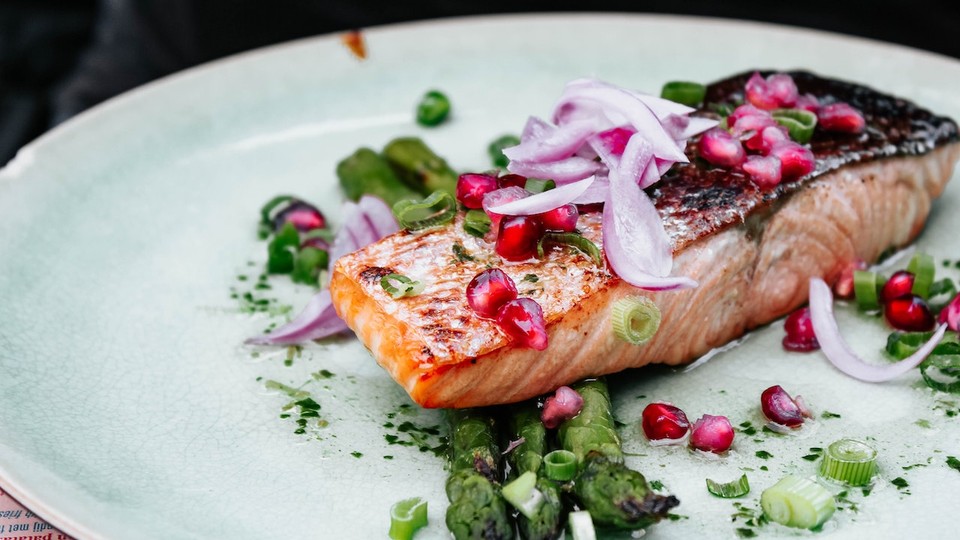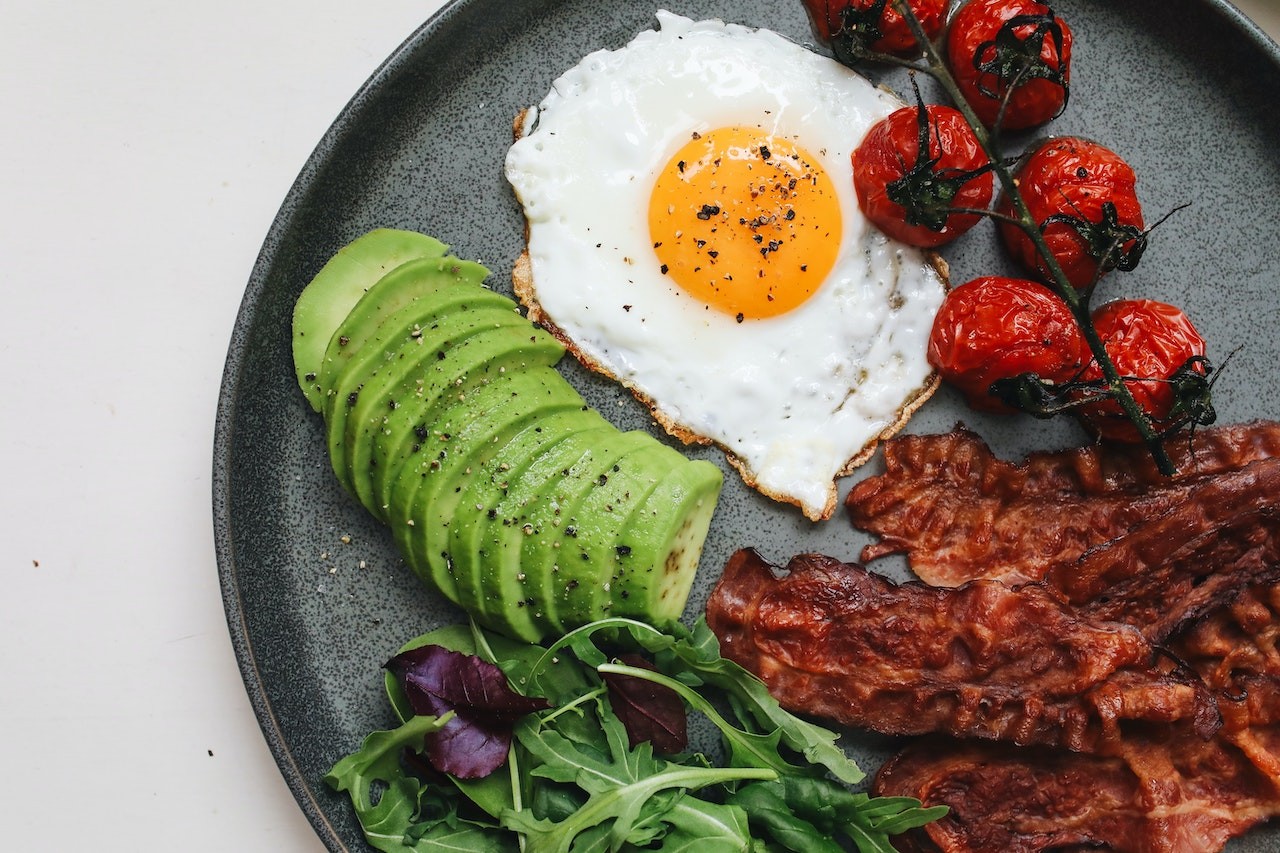
What is the low-carb diet?
Adopt a low-carb diet and you’ll eat a minimal amount of carbohydrates and a higher proportion of quality protein and dietary fat.
There is no formal definition of a low-carb diet. However, most studies suggest a low-carb diet restricts dietary carbohydrates to 10-30% of calories.
The restriction of dietary carbohydrates is mainly from grains, bread, starchy vegetables, sugar-sweetened food and sugary beverages.
This means if you consumed 1,800 calories per day, your carbohydrate consumption would be approximately 45-135 grams of carbs. In place of carbs, you’ll increase your intake of leafy vegetables, protein and healthy fats to meet your nutritional needs and promote the feeling of fullness.
A low-carb diet is associated with many health benefits including weight loss, improved blood sugar control, management of type 2 diabetes and reduction of cardiovascular disease risk factors.
What are the benefits of the low carb diet?
The are several health benefits from eating fewer carbohydrates, from reducing your waistline to minimising your disease risk.
Weight loss
Low-carb diets have been found to be effective in helping people lose weight without the ordeal of counting calories. In fact, some studies showed people lose up to 2-3 times more weight in a shorter period of time than on a low-fat diet.
This shouldn’t come as much of a surprise considering you’ll be avoiding those carbohydrate-rich and high-calorie foods such as sugar, bread, pizza, pasta.
Increased fat loss
Eating carbohydrates stimulates the release of insulin in the body. This is known as the fat-storing hormone. Low-carb diets not only result in less glucose but also help to reduce your insulin levels.
This helps you lose excess body fat, particularly visceral fat that is the most harmful when it comes to your health. For many, this fat loss can be enough to achieve their weight loss goal.
Prevention, management and reversal of type 2 diabetes
A low-carb diet helps to balance your blood sugar levels meaning insulin is kept in check. Eating too many carbohydrates, particularly refined carbs, causes your blood sugar levels to become too high.
This results in insulin resistance which leads to prediabetes and if not managed, it becomes type 2 diabetes. By eating fewer carbohydrates, you’re supporting your body to naturally control its blood sugar levels. FOr people living with type 2 diabetes, this diet can help to reduce or eliminate the need for blood sugar medications.
Reducing cardiovascular disease risk
A low-carb diet may help to reduce your cardiovascular disease risk markers including triglycerides and cholesterol.
High carb consumption especially from sugary foods can cause your blood triglycerides to rise which is one of the strongest factors in heart disease. It also has a very big implication on your cholesterol levels.
Eating a low-carb diet may help to optimise your HDL and LDL markers also leading to improved heart health.
Optimised nutrition
One of the benefits I see from reducing carbohydrates, particularly refined carbohydrates in clients is their improved nutrition overall. Carbohydrates are often a staple in people’s diet and the hero of their meals.
Significantly reducing carbohydrates and correcting the balance of nutrients allows space for more nutrient-dense foods and optimises your diet. This is often all that’s needed to correct nutritional deficiencies, improve gut health, reduce sugar cravings, enhance energy, eliminate brain fog…the list goes on.
Who shouldn’t try a low carb diet?
A strict low-carb diet may not be suitable for everyone.
If you’re a diabetic and taking medication to manage your condition, a low-carb diet needs to be adapted by your health practitioner.
A low-carb diet needs modification if you’re taking medications for your high blood pressure or high cholesterol. This is because the diet naturally helps to reduce high blood pressure and cholesterol markers. So doing so in conjunction with your medication can reduce your BP or cholesterol too much!
If you’re breastfeeding, now may not be the time to launch into a strict low-carb diet without guidance. This is a time where your nutrient demands are at an all-time high. There is also some concern about whether a very strict low carb diet can have implications associated with going into nutritional ketosis. More research is required in this area.
If you are wanting to reduce your carbohydrate intake while breastfeeding, it’s advised you do so by reducing your refined carb intake and ensuring you consume at least 50 grams per day of carbs from fruit, root veggies and whole grains.
Low-carb vs keto diet?

Low-carb and keto diets both reduce your carbohydrate consumption and encourage a greater intake of quality protein and healthy fats.
On a low-carb diet, you’ll be typically consuming between 50-100 grams of carbohydrates a day (some diets will allow for up to 150 grams depending on your required calorie intake). This is reduced to 20 grams or less a day on a ketogenic diet. This limits your carb intake to only no starchy vegetables that are grown above ground and restricts foods such as pasta, bread, rice, potatoes, baked goods and sugary treats.
Some choose to adopt a strict low-carb diet of between 20-50 grams a day if they are not achieving the results they would expect.
What to eat on a low-carb diet
A low-carbohydrate diet emphasises the consumption of a variety of whole foods while limiting the number of carbs. Let’s not confuse low-carb with no carb! You’ll still be able to consume carbohydrates by focusing on those that contain 5% or less.
On a low-carb diet, you’ll typically be filling your plate with:
- Vegetables that grow above ground – leafy greens, cauliflower, cabbage, mushrooms, cucumber, capsicum, tomatoes, zucchini, onions, eggplant.
- Fruit – avocado, berries
- Meat – beef, lamb, pork, poultry, game such as kangaroo
- Fish and seafood – salmon, mackerel, sardines, herring, anchovies, prawns, mussels.
- Eggs
- Full-fat dairy products – butter, yoghurt, cheese, cream cheese, sour cream
- Nuts and seeds
- Natural fat sources – olives, olive oil, coconut oil, coconut products, ghee
- Water
- Coffee and tea
What foods to avoid on a low carb diet
While on a low-carb diet, you’ll want to avoid carbohydrate-rich foods that contain a lot of sugar or starch.
- Sugar and artificial sweeteners – soft drinks, juice, cordial, sports drinks, lollies, chocolate, pastries, baked sweets, cereals, ice cream
- Starches – flour products, wheat, whole grains, rice, corn products, cereals, pasta, crackers, biscuits, porridge, muesli, granola, potatoes, beans and lentils
- Fruit excluding berries in moderation
- Diet or low-fat products
- Beer
- Vegetable oils and products including margarine
5 common low-carb diet mistakes
A low-carb diet is popular because it negates the need to count calories but that doesn’t mean it’s easy to navigate.
As a nutritionist, I see a lot of mistakes when people try a low-carb diet. Here are a few:
1. They don’t track their food intake
Keeping a food diary is the most important step you need to take if you’re wanting to reap the benefits of a low-carb diet or have any health goal.
If you’re not assessing your carbohydrate intake, you’re guessing. It’s very likely that you will be overeating carbs.
Tracking your food intake is so valuable.
2. Eating too much or not enough protein
Protein is a macro-nutrient I often see clients don’t get enough of, particularly of quality sources, regardless of their diet style.
Protein can be helpful in improving the feeling of fullness and increasing your fat-burning ability which is helpful if you’re looking to lose weight.
Low-carb dieters can, however, fall into the trap of eating too much protein. Overeating protein can lead to unutilised amino acids turning into glucose which prevents ketosis from occurring. This is an issue if you are adhering to a ketogenic diet.
Depending on your individual goals and body composition, I recommend you aim for 1.5-2.0 grams of protein per kilo.
3. Fearing fat
Some people still believe dietary fats lead to body fat. This simply isn’t true and if you’re reducing your carbohydrate intake, you need to be consuming fats to compensate.
Now, I’m not suggesting you fill up on bacon, cheese, cream and fried food. We want to focus on your omega-3 rich foods such as fatty fish (salmon, mackerel, sardines), olive oil, flaxseed oil, avocado, nuts and seeds.
If you aren’t getting enough essential fatty acids from your diet alone, taking a supplement such as fish oil or cod liver oil can be helpful.
4. Not adjusting their veggie intake
When counting your carbohydrate intake, you’ll notice that even vegetables contain carbs. If you’re restricting your carb intake, watching how many veggies you eat will be important.
But, reducing your veggie intake too much can result in constipation (a common side effect of the keto diet) as well as negatively disrupt your gut microbiome.
Veggies should still be a hero of your meal, you just need to choose from the large variety of non-starchy options. Think leafy greens, broccoli, cauliflower, asparagus, beans, cucumber, tomato and capsicum.
Any veggie that grows above ground can feature in your low-carb diet.
5. A lack of preparation
One of the drawbacks of a low-carb diet is that it can make eating on the run a little more challenging. If you think about it, you can always grab a sandwich, wrap, sushi or smoothie when out and about looking for something relatively healthy.
A lot of convenience food options rely on carbohydrates to bulk out the meal because they are cheap.
If you haven’t prepared, eating on the go can require some creativity or smarter choices. Things like asking for a burger without the bun, opting for sashimi with a salad, getting veg instead of pasta.
Low carb eating tips to help you reach your goals

As a nutritionist, I see a lot of clients who say “the low-carb diet didn’t work for me” or “it’s too hard”.
While it can be challenging, with the correct preparation you’ll give yourself the best chance of success. So here are my tips on how to go low-carb and reach your goals.
- Establish your carb, protein and fat intake goals so you know how much or how little you can consume.
- Start tracking your diet now, even if you haven’t started low-carb. It will give you a good insight into the areas you need to make the changes most. You can use pen and paper or an app such as MyFitnessPal or Easy Diet Diary.
- Work with a health practitioner to ensure the low-carb diet is right for you, your health goals and any existing conditions. They will also help you put a plan together, work out an appropriate macronutrient intake and give you some great low-carb substitutions.
- Consider decreasing your carb intake slowly, especially if your current diet is high in carbohydrates.
- Get to know your low-carb options. Write a list of your go-to foods and keep it on your fridge or handy on your phone.
- Plan and prep your meals in advance so that you don’t get stuck having to make a rushed, and often poor, food choice.
- Get creative so you don’t feel deprived of living without high-carb foods. Think about your favourite meals and swaps you can make such as cauliflower pizza bases, zucchini noodles in place of pasta, lettuce cups instead of taco shells or ditch the buns for portobello mushrooms.
Potential side effects of a low carb diet
Just like with any dietary change, you may experience side effects as your body adjusts to your new way of eating.
Remember, if you’re coming off a higher-carb diet, you’re going to be detoxing from sugar which may come with some symptoms such as:
- Headache
- Dizziness
- Fatigue
- Irritability
- Nausea
For most people, these side effects subside within a week or two as your body adapts.
If you’re restricting your carbs severely and heading into the keto zone, your symptoms may feel greater and last a little longer as your body switches from fueling with carbs to a fat burner.
My tip is to ensure you’re drinking enough water throughout the day. Sipping on bone broth can also be helpful in overcoming hydration and increasing your sodium intake.



